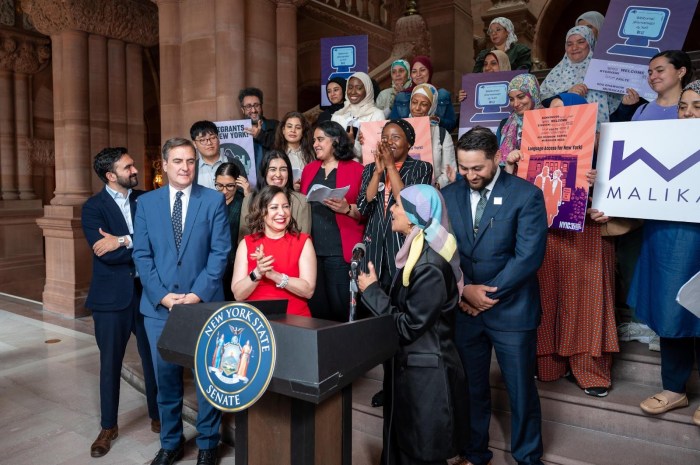
Photo courtesy of Office of AM González-Rojas
Dec. 24, 2024 By Colum Motherway
For decades, Middle Eastern and North African (MENA) communities in New York State have been statistically invisible, lumped into the white category on government documents—a misrepresentation that has hindered their visibility and access to resources. Now, a new law aims to change that.
Assembly Member Jessica González-Rojas, NY State Senator Michael Gianaris, Assembly Member Zohran Mamdani and several advocates celebrated the signing of legislation A6219B into law by Gov. Kathy Hochul on Friday, Dec. 20.
The legislation sponsored by González-Rojas would separate data for Middle Eastern and North African (MENA) New Yorkers from the white category across state institutions.
Middle Eastern and North African communities throughout New York State are inappropriately identified as white in many government documents, which disadvantages representation for these communities.
The MENA bill requires that every state agency, board, department, or commission that directly collects demographic data regarding ancestry or ethnic origin to separate these populations from the White demographic or collect separate data on each major Middle Eastern or North African group.
“For too long, MENA communities have been made invisible by our federal and state government’s lack of data collection or lack of disaggregation. By not including categories for these various communities in the Census and not disaggregating the data in our state institutions, the needs of neighbors have been unaccounted for and ignored,” stated González-Rojas.
Senate Deputy Leader Gianaris said, “Miscategorizing a New Yorker’s race is not only offensive but has real-world impacts on services and resources particular communities receive. I am proud the Governor is signing this critical legislation to recognize and dignify New York’s Middle Eastern and North African communities.”
Malikah, an anti-violence organization committed to building safety and power through anti-oppression, self-defense training, and mutual aid, led the coalition for this bill. It also included the Arab American Family Support Center, YAMA Action, Asiyah Women’s Network, Coalition for Asian American Children and Families (CACF), and the New York Immigration Coalition.
“I am so proud to have worked with Malikah, the coalition of organizations, and my Senate partner, Senator Gianaris to have gotten this bill signed into law. It is past time that these communities are accounted for and better understood and represented. This will allow us to better serve them as government and to offer them the resources they need and deserve.” added González-Rojas.
MENA communities across New York State remain underserved, exhibiting higher rates of language access needs, housing insecurity, poverty, domestic abuse, and health disparities. Businesses and organizations that primarily serve these communities struggle to receive equity-based aid because those they serve are classified as white.
This can directly impact New Yorkers – such as when a small business is applying for small business development support and is denied because they are demographically mischaracterized. It could also block access to academic scholarships for minorities because MENA individuals are categorized as white.
“As someone who grew up in and organizes in Little Egypt, I’m thrilled to see the passage and signage of the NY MENA Data Disaggregation bill by Gov. Kathy Hochul, with the leadership support of State Senator Gianaris and Assembly Member González-Rojas. This is a much-needed and long-awaited step toward ensuring that MENA New Yorkers are counted, seen, and supported,” said Rana Abdelhamid, Executive Director and Founder of Malikah.
“This effort has significant civil rights and equity implications, but we know this is just the beginning. We must continue organizing as a coalition to ensure that MENA communities in New York achieve the equity, visibility, and representation we deserve. Malikah is committed to this work, and I’m proud of the grassroots power and our NY MENA coalition that has made this victory possible.”
González-Rojas represents the 34th Assembly District, which includes the neighborhoods of Astoria, Corona, East Elmhurst, Elmhurst, Jackson Heights, and Woodside in Queens. There is a large MENA representation in many of these communities.
“The passage of this bill has been long overdue for our communities. For decades, we have been misrepresented and under-resourced,” added Badr Alsaidi, Yemeni American Community Activist. “This marks a significant milestone in achieving fair representation, ensuring we are seen, heard, and supported. We look forward to continuing our work as a coalition to guarantee that our communities have a strong voice in decisions that affect their everyday lives.”
One Comment

So I’m Turkish and I’m not white anymore? What about Israelis? Are they not white anymore. Gianaris, Rojas and Zalman are the 3 stupidest people I’ve ever heard of.